In the beginning of September the VII Voloshin's Festival made Crimea the literary capital of Russia. As it is extremely far from Australia to Crimea, we decided to at least talk about Crimea, sitting among the first spring flowers of Sydney's grass.
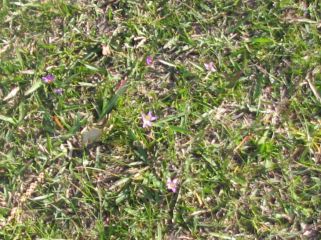 |
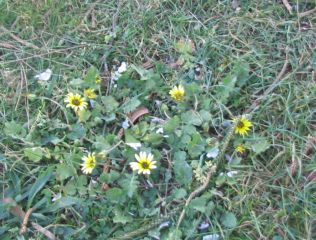 |
For Australians Crimea means, first of all, the Crimean War, and we gathered near Russian cannons, which were the trophies from Sevastopol, sent to main cities of British Empire, including Australian: Melbourne, Adelaide, Sydney and Tasmania (Perth remained without cannons due to their poor support of the Crimean war's funds). Interestingly, the highest military decoration of British Empire, Victoria Cross is made from the gunmetal of these cannons.
 |
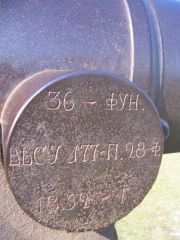 |
Sydney cannons were initially placed in Botanic Gardens and then, in 1920, were moved to their current place in Centennial Park. Cannons are situated near the statue «We won» made by Italian-Australian sculptor Tomaso Sani, who worked in an ironical pseudo-classical style during the late 19th century. The sculpture is not related to any war, but represents, through Heracles, lions and thousands of Cupids, victory in a rugby match.
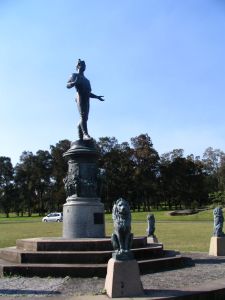 |
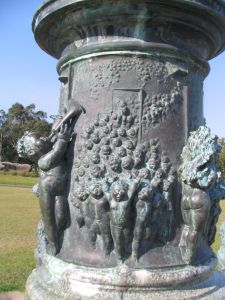 |
Gleb Bonch-Osmolovskiy told us about Crimean War as the first «modern» war which had a strong influence on the world. Even the casus belli was the typical 20th century's problem — a conflict in the Middle East and Balkans. The conflict arose because of the keys from the Church of the Nativity in Bethlehem. For many years Greek Orthodox Church held the keys, but Napoleon III demanded to pass the keys to Catholics. Turkey accepted his demand, which offended Russia and in protest Russia moved its army into Danubian Principalities. There is an opinion that Napoleon III provoked Russian tsar, because Nicholas I was the only European monarch who hadn't entirely recognized him as the legitimate ruler of France and addressed Napoleon III as «mon ami», not «mon frere» as he should have according to the etiquette. So England and France supported Turkey in Russian-Turkish war. Then, after the victory of Nachimov in the battle of Sinop, Allied fleet entered Black Sea. In few months diplomatic relations between Russia and France, and Russia and England were broken, and soon Crimean War had started: in September 1854 Allied troops landed in Crimea.
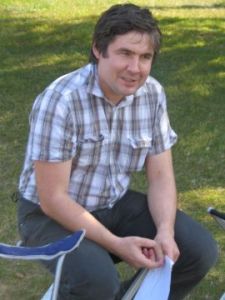 |
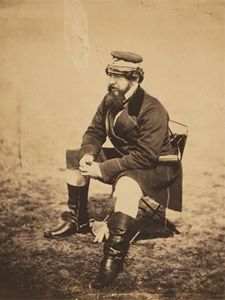 |
| William Russell. Photo by Roger Fenton (from collection of Library of Congress) |
It was the biggest European war between wars of Napoleon I and World War I. Many well-known modern subjects originated there:
The Crimean war produced many well-known phenomena in Russian, as well as in English culture. For example, expression «shapkami zakidaem» («will bombard them with our caps» was the promise made by general Kirjakov before the first battle), and «gladko bylo na bumage, da zabyli pro ovragi» («it was easy on the paper, but they forgot about ravines», the lines from Leo Tolstoy's poem about ill-fated attempt to de-blockade Sevastopol). In England, the concepts of «Thin Red Line» (a line of Scottish troops dressed in red uniform) and «The Charge of the Light Brigade» (disastrous charge of British cavalry, glorified by Alfred Tennyson) are well known even now. Even the first Russian feature film (1911) was about the defense of Sevastopol.
During our meeting Igor Fastovskiy read the poem «The Charge of the Light Brigade» by Alfred Tennyson.
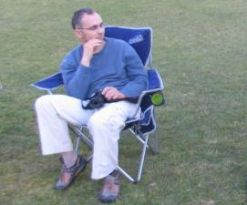 |
 |
| Richard Caton Woodville. The Charge of the Light Brigade, 1895 |
Tatiana Bonch-Osmolovskaya told us about traces of the Crimean war in Australian literature. Not many Australians participated in the war, so the cultural response to it was minimal. But Charles Harpur wrote the poem «The battle of Inkerman (The truest Version)». According to the poet, heroic actions by allies were doomed to failure by worthless command.
Interestingly, similar opinion was expressed in the poem «from the other side», the song «How on fourth…» which became the only poem written by Leo Tolstoy.
Later Harpur returned to the image of battle of Inkerman in the famous poem «Words».
In English literature, Crimean war appears multiple times: from an anecdote about sergeant Buckley in James Joyce's Finnegans Wake, to the alternative history in Jasper Fforde's novels where Crimean war lasts till our days.
Britain still can't forget Crimean war, but for Russian people Crimea is much more ancient history!
 |
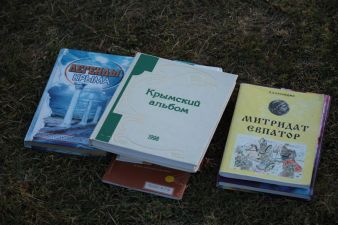 |
| Constantin Bogaevski. Last rays, 1903 |
More than 2500 years ago Crimea was a Greek colony. For Greeks, Crimea was the far north, a place of Boreas, Achille's islands and temples of cruel goddesses. Then, Crimea was part of Bosporan Kingdom with the capital in Pantikapey (contemporary Kerch), which fought with Rome for the world supremacy. In the 18th century Crimea became Russian, and since the trip of Catherine the Great to Crimea, the development of new lands began. First Russian poet of Crimea was Semen Bobrov. Semen Bobrov (1763-1810) studied in Moscow University, he wrote odes and poems published in Moscow and St. Petersburg press. He traveled a lot across the Crimea — and wrote about it. An extract of his poem «Taurica, or my summer day in Chersonesos Taurica», which became the first literary text about Crimea in Russian, was read by Tatiana.
Konstantin Batyushkov wrote an elegy «Taurica». In this elegy poet created a romantic picture of the Crimea.
Crimea inspired Alexander Pushkin for the poem «The Fountain of Bakhchisaray», and elegy «The Daily Orb Doth Die».
Then we moved to poetry of the 20th century and talked about Maximilian Voloshin, who created a center of Russian literary life in Koktebel.
Nora Krouk read a poem of Voloshin «The head of m-me de Lamballe», famous due to the song of Vertinskiy, and her own translation of the poem to English.
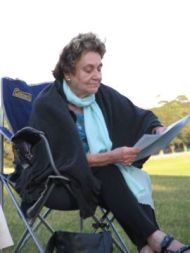 |
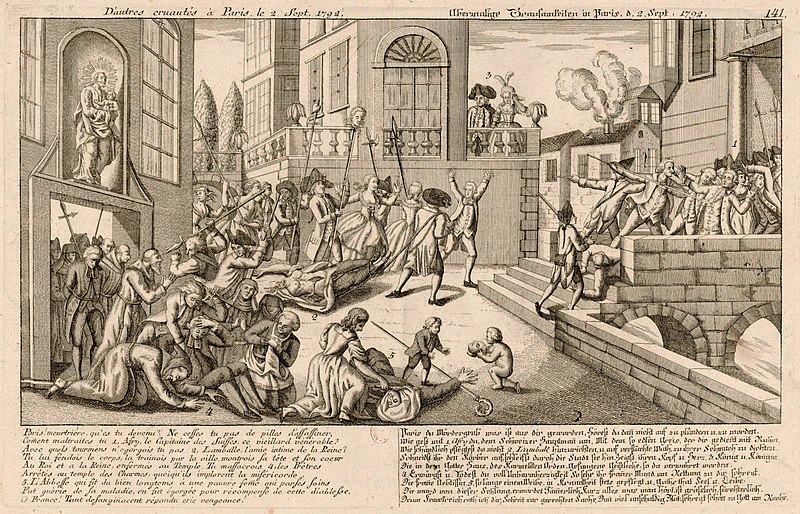 |
| Death of m-me de Lamballe |
Then we again moved in time for a century, to the present days. Nowadays, Crimean Geopoetic Club is formed and Crimean Album is being published in Feodosiya. Koktebel hosts literary Voloshin's Contest and Voloshin' Award is presented there.
After reading few modern poems about Crimea, we returned to Australia and listened to short stories: Dmitriy Lobanov's «Crimea» and Tatiana Bonch-Osmolovskaya's «Baba Yaga».
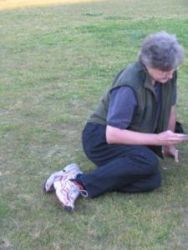 |
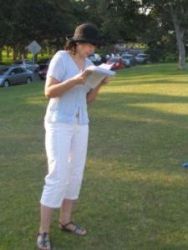 |
With the sunset Crimean Symposium in Australian was drawn to a close.
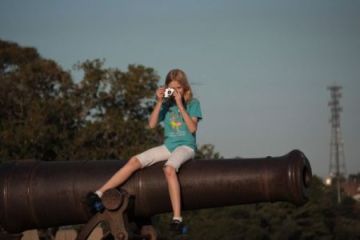 |
* Russian cannons are located on the small hill, across the Grand Drive from the Centennial park cafe.
** Symposium, as defined by classical Greeks, is a friendly debate on philosophical topics accompanied by drinks.